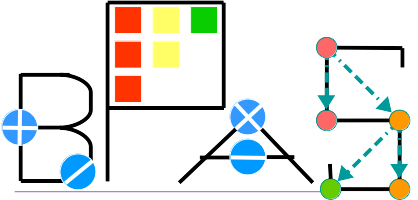The Basic Polynomial Algebra Subprograms (BPAS) library provides
support for arithmetic operations
with polynomials on modern computer architectures,
in particular hardware accelerators.
Typical operations are polynomial multiplication, multi-point
evaluation and interpolation, real root isolation for both
univariate and multivariate systems.
Its code is written in C++ with
CilkPlus extension targeting multi-core processors.
BPAS is also available on GitHub.
- Polynomial multiplication and matrix multiplication are
at the core of many algorithms in symbolic computation.
- Algebraic complexity is often estimated in
terms of multiplication time.
At the software level, this reduction to multiplication
is also common (Magma, NTL, FLINT, ...).
- BPAS design follows the principle
reducing everything to multiplication.
Notice: BPAS continues to go through major revisions. Code may not be stable or backward compatible until the next major release.
New in 2021
Power Series: Parallel processing for Hensel's lemma and Weierstrass preparation, CASC 2021
Computational schemes for subresultant chains, CASC 2021
- Half-GCD, speculative, modular
New in 2020
Power Series: Multivariate Lazy Power Series in C, CASC 2020
- Univariate Polynomials over Multivariate Power Series
- Weierstrass Preparation, Factorization via Hensel's Lemma
Parallel Fourier-Motzkin Elimination, CASC 2020
- Compiled binary available here.
RegularChain: triangular decomposition parallelized, ISSAC 2020
New in 2019
Big Prime Field FFT (ISSAC 2020)
Fourier-Motzkin Elimination
Exposed BPAS ring classes
Integer
RationalNumber
ComplexRationalNumber
Fraction
SmartFraction
SmallPrimeField
BigPrimeField
GeneralizedFermatPrimeField
DenseUnivariateIntegerPolynomial (also named as DUZP)
DenseUnivariateRationalPolynomial (also named as DUQP)
SparseMultivariateIntegerPolynomial (also named as SMZP)
SparseMultivariateRationalPolynomial (also named as SMQP)
SparseUnivariatePolynomial<Ring>, taking any BPAS ring as the coefficient type
DenseUnivariatePolynomial<Field>, taking any BPAS field as the coefficient type
UnivariateRationalFunction<UnivariatePolynomialOverField, Field>
SmallPrimeFieldDistributedDenseMultivariateModularPolynomial (also named as SFDDMMP)
DistributedDenseMultivariateModularPolynomial<Field>
Exposed BPAS triangular set classes
TriangularSet<Field, RecursivePoly>
RegularChain<Field, RecursivePoly>
ZeroDimensionalRegularChain<Field, RecursivePoly>
Nice Features
Polymorphic integration code features exact integration (as a formal sum) and symbolic-numeric integration of both dense and sparse representations of rational functions.
Questions & Comments

